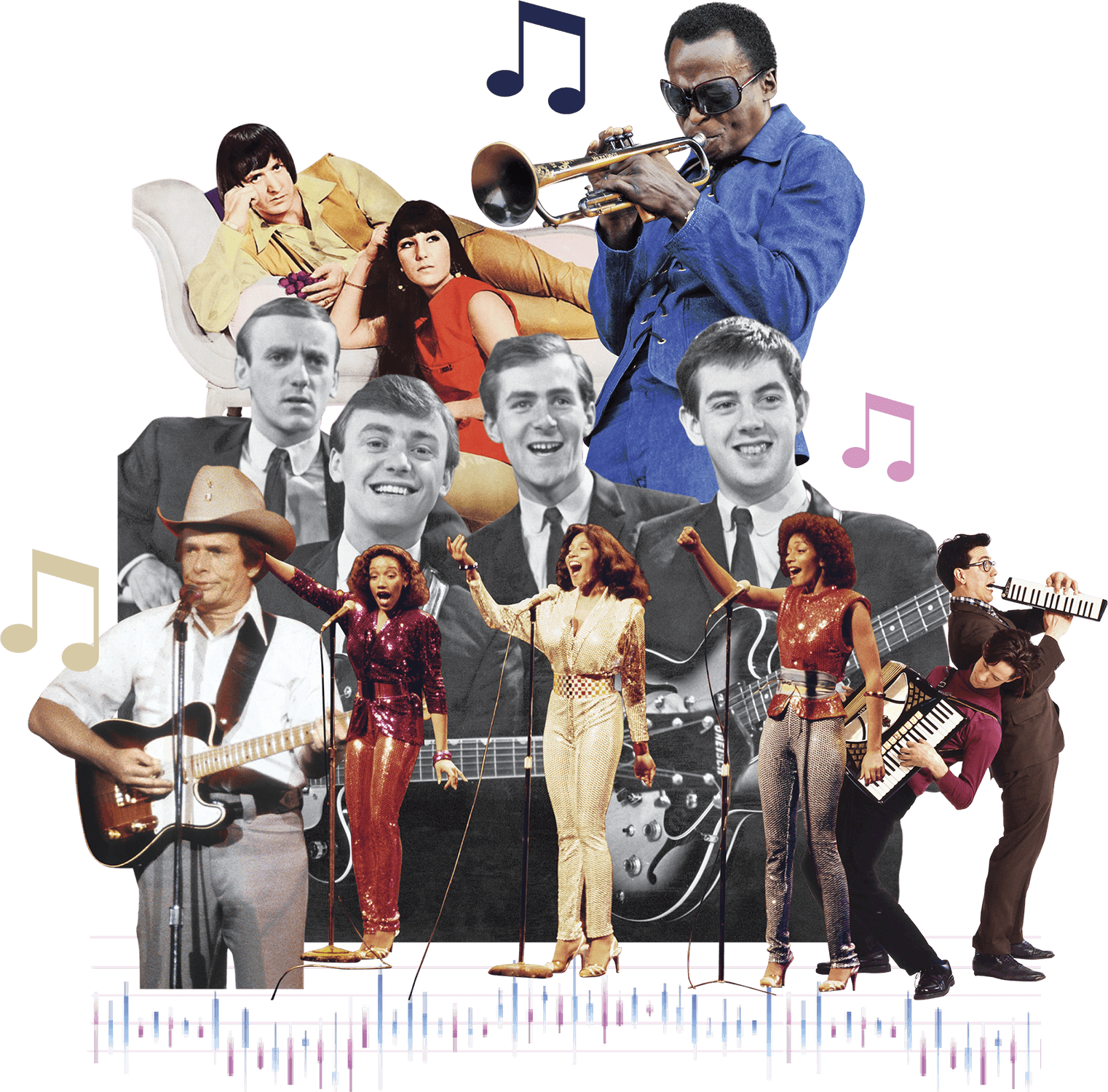BETWEEN US

Robert Love EDITOR IN CHIEF
You Must Remember This ...
How music triggers memories—and offers surprising hope

Left to right, top row: Sonny and Cher, Miles Davis; middle row: Gerry and the Pacemakers; bottom row: Merle Haggard, Sister Sledge, They Might Be Giants
IS THERE A SONG that takes you back—to a place, a time, a love of your life? But why even ask? I already know the answer. Music has this mysterious power to reawaken long-buried memories in our brains. And scientists are coming to believe it can strengthen and even revive the connections between neurons. That’s heady stuff indeed (pun intended).
My own musical time machine is “Ferry Cross the Mersey,” by Gerry and the Pacemakers. I heard this poignant song played by a cover band at Melanie Roberts’ eighth-grade graduation party in Long Island, and I was transfixed. Eyes closed now, I can still hear every note, feel the dampness under my suit jacket and recall with wonder the girls of St. Ignatius Loyola grammar school, suddenly transformed into young ladies in party dresses and heels. We had been children together, and now we were halfway to adulthood.
Magazine staffers have their own stories. Executive Editor Stephen Perrine tells me that old country songs like Merle Haggard’s “Swinging Doors” remind him of his dad and uncles. The first few notes of the “Pink Panther” theme whisk Senior Editor Claire McIntosh back to a New York afternoon when a street saxophonist broke off his solo to pay musical tribute to her fuchsia outfit. Deputy Editor Neil Wertheimer recalls the first time, at age 13, he heard classic jazz—specifically, a mournful ballad by Miles Davis. Wertheimer eventually became a music reviewer and even named his son Davis. And Senior Writer/Editor Nancy Kerr says “We Are Family” by Sister Sledge brings her back to her sorority days—“And yes, I still sing and dance to it, to my teen’s embarrassment.”
Not all the memories were happy, though. Robin Katzman, who coordinates much of our celebrity coverage, recalled learning of her parents’ divorce via the Sonny and Cher song “You Better Sit Down Kids.” And for Executive Editor George Mannes, the upbeat 1996 They Might Be Giants version of “New York City” took on a darker meaning when it came up on his MP3 player during a jog not long after 9/11. “Years later, ‘New York City’ can still make me tear up,” he says.
We at the magazine got a glimpse of music’s power back in 2020, when we sent journalist John Colapinto to profile Tony Bennett, in the story in which the singer’s family first revealed that he had been diagnosed with Alzheimer’s disease. The singer barely spoke to Colapinto, but miraculously came alive and sang when a pianist began to play.
When we decided to investigate the science behind that miracle, we put Colapinto on the job. What he discovered (see “The Extraordinary World of Music and the Mind”) is a burgeoning field of science that is discovering new ways for music to help patients—and the rest of us. Some of Colapinto’s sources were members of a study on music by the Global Council on Brain Health, a scientific collaborative convened by AARP to advance the science of cognition to help people age well.
As part of our nod to music and memory, journalist Rob Tannenbaum was able to get Ringo Starr to open up about his own musically triggered memories (see “Ringo”). But our inquiry goes beyond the pages of this magazine. AARP is blessed with a talented staff who produce pieces for our website, e-newsletters and social media, as well as virtual lectures and events. Members of all of these teams got into the act, producing dozens of pieces about the impact of music on the lives of people over 50. You’ll find a sampling listed (“The Music and Memory Project”), and links to the whole project at aarp.org/musicandmemory.
We hope the project will get you thinking about the mysterious, miraculous power of music in your own life.

SHARE YOUR MEMORIES
Visit our Facebook page at facebook.com/aarp to join the conversation. And let’s all resolve to listen to more music—and make more sweet memories—in 2024.